Posts Tagged ‘growing up’
1月 1, 2023
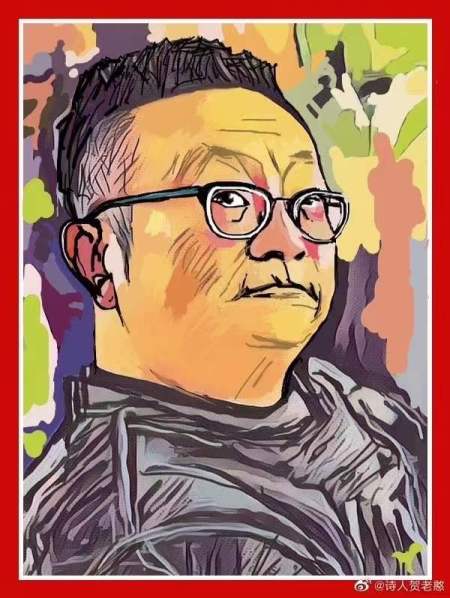
Shen Haobo
HERBSTBLÜTENDUFT
Heimgefahren in den Feiertagen,
Besuch bei der bettlägrigen Tante.
Ich sitz an ihrem Bett
und bemüh mich
etwas Tröstliches zu sagen,
weiß aber nicht, wo ich anfangen soll.
Da sagt sie zu mir:
“Mach die Tür zu,
die Blüten riechen zu stark.”
Ich bin überrascht, sie sagt weiter:
“Ich kann den Osmanthus
sowieso nicht mehr riechen.”
Ich mach die Tür zu,
tret in den Hof, seh den Baum
mit lauter kleinen Blüten.
Wie kleine goldene Pillen,
die Zweige sind alle
ganz dicht uebersät.
Dieser Baum ist ganz klein
in unseren Hof gekommen,
meine Tante hat ihn wachsen gesehen,
so hat sie auch mich wachsen gesehen.
So viele Jahre zu dieser Zeit
möcht ich so gerne heimfahren,
unter dem Baum sitzen
die Blüten riechen.
Aber es hat nie funktioniert.
Heuer hab ich sogar drauf vergessen,
bin aber grad zur Blüte gekommen,
nur hat der Lungenkrebs meiner Tante
sich schon im ganzen Körper verbreitet,
deshalb ist ihr der Duft zu stark,
ihre Atemwege werden gereizt,
die Brust tut ihr weh.
2022-10-02
Übersetzt von MW am 1. Jänner 2023
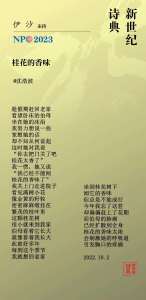
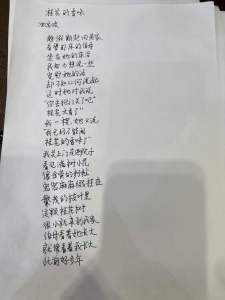
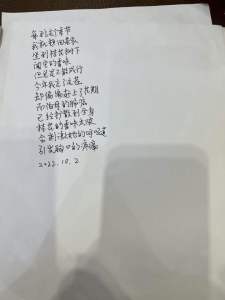
伊沙推荐语
本诗仿佛为现代诗学提供原理自证,在传统诗学中,意境高于天,一但建立,绝不自破,现代诗学,与之相反,想建就建,想破就破,原理何在?意境虽美,生活真相,太过强大,太过残酷!本诗在元月上半月推荐诗中当获亚军。
新世纪诗典第12季,NPC2023年1月2日,4291首,1306人。第37个沈浩波(北京)日
徐江点评《新诗典》沈浩波《桂花的香味》:花香伴着生命,在岁月中时隐时现,它们有时交融,有时却又互相推拒。本诗反映出沈诗是近年在体察入微一极的代表。
沈浩波:给新诗典投了近12年稿了。已成常态,已成习惯!12年!
《新诗典》小档案:沈浩波,1976年出生于江苏泰兴,1999年毕业于北京师范大学中文系。现居北京。
1998年发表《谁在拿90年代开涮》一文,这篇文章后来成为引发1999年中国先锋诗界“民间立场”和“知识分子写作”大论争(盘峰论争)的导火索。并成为该诗歌论争中“民间立场”一方的中坚人物之一。
2000年7月和一些朋友一同发起创办《下半身》同人诗刊,并写作《下半身写作及反对上半身》。掀起了对中国诗歌影响深远的“下半身诗歌运动”。
出版有诗集中文诗集《心藏大恶》、《蝴蝶》、《文楼村记事》、《命令我沉默》、《向命要诗》、《花莲之夜》等,西班牙语诗集《下半身》,韩语诗集《理想国》。
曾获得2000年《作家》杂志诗歌奖;2008年御鼎诗歌奖;2010年《人民文学》诗歌奖;2011年中国首届桂冠诗集奖;2012年首届“新世纪诗典”金诗奖等;2012年第三届长安诗歌节. 现代诗成就大奖;第十一届华语文学传媒大奖.年度诗人奖。2013年《十月》诗歌奖。2016年度王维诗歌奖等。第八届李白诗歌奖成就奖。
2016年12月3日,在微信朋友圈发表《关于各种诗歌奖》一文,宣布从此不再接受任何国内诗歌奖项。
2015年创办“磨铁读诗会”,致力于传播、推广、出版中国当代先锋诗歌和世界范围内的优秀诗歌。
诗歌被翻译成英语、西班牙语、德语、俄语、丹麦语、韩语、荷兰语、波斯语、阿拉伯语、印地语等在海外发表约100多首
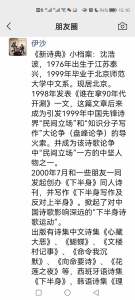
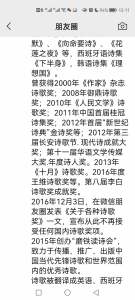
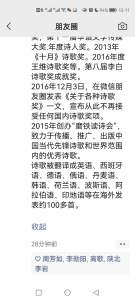
标签:aunt, blossoms, body, breath, breathing, cancer, country, courtyard, death, disease, family, growing, growing up, home, house, memory, NPC, outside, pain, people, poetry, regret, scent, Shen Haobo, sick, sickness, story, tree, village, 新世纪詩典, 新世纪诗典, 沈浩波
发表在 1970s, 1976, 1980s, 1990s, 2000s, 2010s, 2020s, 2022, 2023, 20th century, 21st century, January 2023, Middle Ages, NPC, October 2022, poetry, Translations, 新世纪诗典, 沈浩波 | 3 Comments »
10月 14, 2022

Li Weiran
APPLAUSE
You know
on this world
who is nice to you
more than anyone?
Mosquitoes,
must be mosquitoes.
From when you’re small
they leave red packages, so many!
Small package big package
they don’t take no
for an answer.
They come up right to your ear,
dancing, singing,
make you so happy you can’t sleep at all,
you have to get up
and clap your hands.
Translated by MW in Oct. 2022
Li Weiran
APPLAUS
Weißt du, wer
auf dieser Welt
am nettesten
zu dir ist?
Moskitos.
Auf jeden Fall Moskitos.
Von klein auf kriegst du von ihnen
die meisten roten Geschenkpackete.
Große Packete kleine Packete,
ablehnen geht nicht,
sie drängens dir auf.
Sie kommen ganz nah zu deinen Ohren,
sie tanzen und singen,
du wirst so froh, du kannst gar nicht schlafen,
du musst einfach aufstehen
und applaudieren.
Übersetzt von MW im Oktober 2022


《新诗典》小档案:李蔚然,女,2014年生于陕西西安。西安经开第三小学2020级1班学生。《妈妈,您辛苦啦》荣获第十九届“希望杯”省级决赛一等奖、《漂亮的蘑菇房》荣获第十九届“希望杯”全国总决赛二等奖。喜欢阅读诗词和历史书籍,特别喜欢创作诗歌,认为它代表了生活,能带给大家美好和希望。
伊沙推荐语:
一个"红包",把我笑煞;一个"红包",什么都有了,这便是孩子的天趣自成。本诗来自于我中学同学、平生第一位诗友姜雁飞的助攻。

伊沙主持 | 新世纪诗典12一周联展(2022.10.9——10.15)
标签:animals, blood, dance, gift, growing up, insects, Li Weiran, mosquitoes, NPC, people, sound, 新世纪詩典, 李蔚然
发表在 1990s, 2000s, 2010s, 2014, 2020s, 2022, 20th century, 21st century, Middle Ages, NPC, poetry, Prehistoric times, Translations, 新世纪诗典 | Leave a Comment »
8月 17, 2022
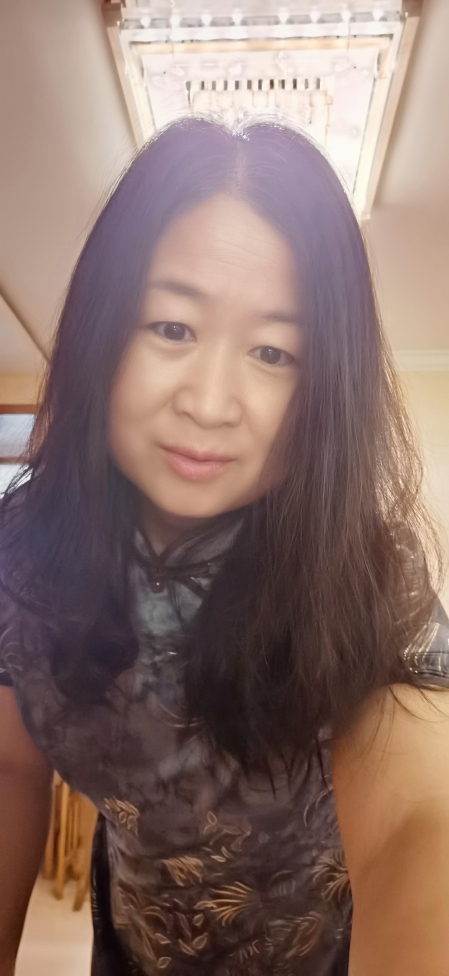
An Ruo
AUS DEM FRÜHBEET
Er war dieses schwächliche Kind,
lass ihn Aufgaben schreiben, er weint,
lass ihn keine schreiben, dann weint er auch.
Ich sitz in der Pause an meinem Handy,
er kommt zu mir und sagt,
Frau Lehrer, meine Mama schaut immer auf ihr Handy!
Dann hat er mich auf einmal geschlagen.
Ich dreh mich überrascht um,
er lacht und sagt,
da war eine Fliege.
2022-07-15
Übersetzt von MW im August 2022


伊沙推荐语:本诗作者,本该在一个月前便与大家见面,但是她本来获选的诗夹杂着一个符号化的人物,容量引起非艺术争议,我到临推荐之前放弃了,请她另投一组重选,她经受住了考验。不仅在中国,而是在全世界,不能在纯诗范畴出好诗的就不是真正的好诗人。本诗好在细节的突发,恰似生活的现场。
况禹点评《新诗典》安若《育苗记》:诗中的学生太可爱了。这一瞬间,也正是只有作为教师才能体验到的。大学时各班排话剧,我即兴编的一句“这就是生活”,被三班的钟品大赞,后面排练时反复借用。读此诗不由又想起这句,不过不再是即兴,而是有过类似体验后的有感而发。所谓“艺术来源于生活”,话没错,但也要看作者从生活中拿的是什么。本诗拿的,正是诗歌与文学要的。
【亚坤评诗】
育苗记
作者|安若
(内容详见新诗典今日推送)
特别有趣的一首诗。我个人把诗歌趣味性看成是现代诗的基本属性之一。如果一个写作者始终无法突破这一层(器道并进,进出自由),严格意义上讲,就没有真正进入现代性。有关本诗,说两点思考。
1.它有典型性人物。人物性格特别突出。老师和学生的人物性格都非常突出。尤其是学生,他是有态度的。甚至,心里具有令人难以捉摸的“孩童心思”(通过他的具体行为就能看出来)。
2.诗歌有一种很典型的内部空间。这个空间是由老师和学生的心理空间共同构成的。你不要小看诗中的那几句话。那个时候,师生的“内心河流”一直在相互对撞和交融。
它是诗产生的一个基础。这里面,始终有一种“场域”存在。我把它称之为“诗歌场域”!
本诗就一直有。仔细体会这二人背后的心理和精神空间就能明白。
最后面那个“苍蝇”物象的运用,也特别好,达到了多重效果!
(马亚坤.2022.08.17.上海)
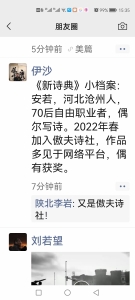
标签:An Ruo, child, children, growing up, memory, mobile phone, NPC, people, phone, school, students, success, surprise, teacher, teaching, weak, 安若, 新世纪詩典
发表在 1970s, 1980s, 1990s, 2000s, 2010s, 2020s, 2022, 20th century, 21st century, August 2022, July 2022, Middle Ages, NPC, poetry, Translations, 新世纪诗典 | Leave a Comment »
9月 23, 2020

Liu Ge
PFERDEFLEISCH
Die Pferde in unseren Gedichten
sind ein Teller Fleisch auf dem Tisch.
Die echten Pferde
grasen
und trinken
an der Nordgrenze
am Himmelsfluss
und streicheln einander.
Ausgewachsene Pferde
haben glänzende Schläfen
bis die Hirten
sie schlachten
verpacken
und Eselfleischhändlern aus Hebei verkaufen.
Sowas geschieht
überall auf der Erde
wo die Lyrik nicht hinkommt.
3. Juli 2020
Übersetzt von MW im September 2020
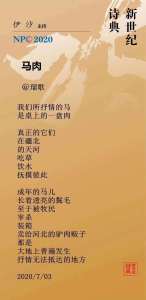

标签:animals, donkey, drinking, eating, grass, grassland, growing up, horses, killing, Liu Ge, meat, NPC, people, poetry, slaughter, 新世纪詩典
发表在 2020, 20th century, 21st century, Antique times, July 2020, Middle Ages, NPC, poetry, September 2020, Translations, Uncategorized, 新世纪诗典 | Leave a Comment »
6月 2, 2020
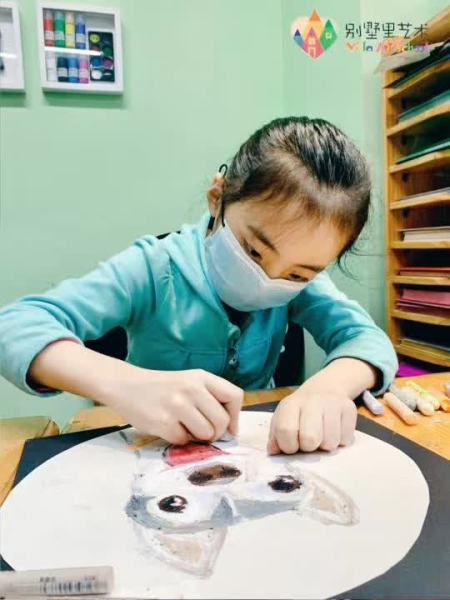
Hai Jing
WISDOM TOOTH
Lung disease lockdown,
couldn’t go anywhere.
Held down for over three weeks,
held it until a wisdom tooth grew.
2/17/20
Translated by MW on June 2nd, 2020


标签:art, body, child, children, disease, expression, freedom, growing, growing up, growth, Hai Jing, lockdown, mind, mouth, NPC, pandemic, people, poetry, teeth, thought, thoughts, virus, wisdom, 新世纪詩典, 海菁
发表在 2020, 20th century, 21st century, April 2020, February 2020, January 2020, June 2020, March 2020, May 2020, Middle Ages, NPC, poetry, Translations, Uncategorized, 新世纪诗典 | Leave a Comment »
2月 26, 2020

Su Jie
PUBERTÄT
Mit 14 Jahren, Mittelschule.
Drei Tage kein Wasser, kein Strom.
Nordwestwind heult.
Dann Schnee, dichte Flocken.
Guo Hongying von unserem Wohnheim
hat ein Waschbecken mit Schnee vollgeschöpft.
Ein paar von uns zusammen,
wir haben uns mit Schnee das Gesicht gewaschen,
dann abwechselnd vorm kleinen Handspiegel
schneeweiße Creme aufgetragen.
2020-01-05
Übersetzt von MW im Febr. 2020


标签:cleaning, dormitory, electricity, girls, growing up, life, make-up, memory, NPC, people, poetry, puberty, school, snow, washing, water, 夙洁, 新世纪詩典
发表在 1970s, 1980s, 1990s, 2000s, 2010s, 2020, 20th century, 21st century, February 2020, January 2020, Middle Ages, NPC, poetry, Translations, Uncategorized, 新世纪诗典 | Leave a Comment »
2月 23, 2020

Zhong Dao
GROSSE ZEHEN
Die zwei Wochen
sagt mir mein Sohn
seine Socken sind von seinen großen Zehen durchgestoßen.
In einer einzigen Woche
hat er zwei Paar Socken
mit großen Löchern,
die großen Zehen wollen nicht hören,
wetzen von innen heraus.
Mir fällt kein Grund ein,
also sag ich ihm,
die großen Zehen sind jetzt am Wachsen.
Dann fällt mir ein als ich klein war
ist das auch oft passiert,
dass große Zehen durch Socken brechen,
darüber hab auch nie nachgedacht.
Nicht nur Socken
sind von großen Zehen durchgewetzt worden,
auch Unterhosen
haben Löcher bekommen.
1. Dezember 2019
Übersetzt von MW im Februar 2020

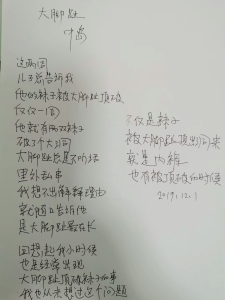
http://blog.sina.com.cn/s/blog_68d111990102z5xn.html
标签:big, boy, child, children, family, father, growing, growing up, life, memory, NPC, pants, people, socks, son, thoughts, toes, underwear, Zhong Dao, 新世纪詩典, 中岛
发表在 2000s, 2010s, 2019, 2020, 20th century, 21st century, Antique times, December 2019, February 2020, Middle Ages, NPC, poetry, Translations, Uncategorized, 新世纪诗典 | Leave a Comment »
4月 26, 2019
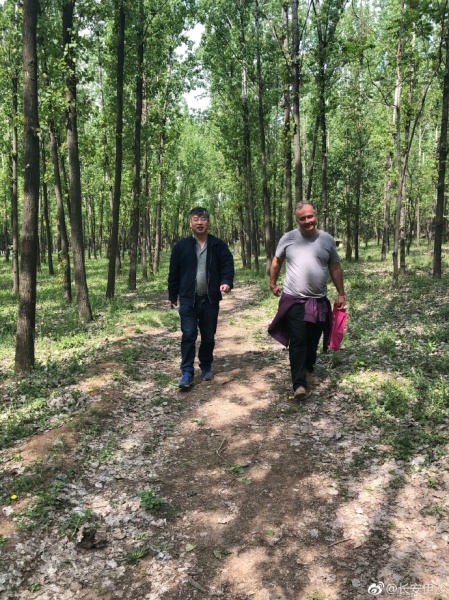
WHAT DOES IT MEAN TO BE HUMAN?
what does it mean to be human?
what does it mean to be alive?
means you’re not dead yet.
means you can ask superfluous questions.
goddammit, every animal knows
what it means to be an animal.
right?
our children are growing up
discovering love
they always had love, but
any animal knows this is different.
they are bewildered by their own bodies.
again, this has gone on for a while,
it just grows more acute,
and again, every animal knows.
goddammit,
what a luxury question.
what does it mean
to be mean?
not the golden mean.
everyone knows what it means to be mean.
he’s in the news
and on the news every day.
to be human
means to have rights.
doesn’t it?
1947, UN-declaration,
two people from China
worked on it.
Animal rights.
Post about dying whales,
you’ll get 1000s of likes,
about people, oh well.
I want to call this poem
stupid question.
Thank you!
Now go forth and profligate,
or whatever.
MW April 3, 2019
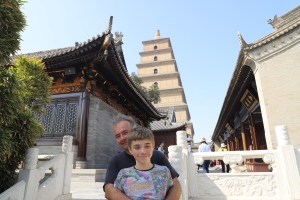
ALWAYS ONLY THE CULTURE
always
always only
always only the
always only the culture
always only the culture
always only the cultural
revolution
always only the cultural
revolution
since 1966
always only the cultural
revolution
always only the cultural
revolution
always only the culture
always only the culture
always only the
always only
always
not the famine
but
but still
but still also
the tens of millions
starved to death
but
but still
but still also
but still also
the terror
the totalitarian
terror
“totalitarian” is in dictionaries
and in chinese search engines
china is hardly
mentioned at all
as neighbor of the soviet union
and in art
in the art
of the cultural revolution
always only the culture
always only the culture
hannah arendt
died in 1975
before the end
of the cultural revolution
in the last edition she saw
of her seminal work
origins of totalitarianism
at least in the german edition
she mentioned china
in the cultural revolution
hardly anyone mentioned the famine
always only the culture
always only the culture
but
but still
but still also
the terror
the terror
pinochet
pol pot
kissinger
who downed more
who did more
who bombed more
1979, democracy wall
in beijing
since 1979
capitalism
reigns supreme
the party reigns supreme
through capitalism
or the other way
through kaputalism
or the other way
everything demolished developed
and demolished again
or the other way
of course only in china
but
but still
but still also
always only the culture
always only the culture
always only the
always only
always
always
MW March-April 2019
IMMER NUR DIE KULTUR
immer
immer nur
immer nur die
immer nur die kultur
immer nur die kultur
immer nur die kultur-
revolution
immer nur die kultur-
revolution
seit 1966
immer nur die kultur-
revolution
immer nur die kultur-
revolution
immer nur die kultur
immer nur die kultur
immer nur die
immer nur
immer
nicht die hungersnot
oder
oder doch
oder doch auch
die zig millionen
hungertoten
oder
oder doch
oder doch auch
der terror
der terror der
totalitären herrschaft
“totalitär” gibt es in wörterbüchern
und in chinesischen suchmaschinen
china wird dabei höchstens
ganz wenig gestreift
als nachbarstaat der sowjetunion
und in der kunst
der bildenden kunst
der kulturrevolution
immer nur die kultur
immer nur die kultur
hannah arendt
ist 1975 gestorben
also vor dem ende
der kulturrevolution
in der letzten auflage ihres hauptwerks
ursprünge und elemente totalitärer herrschaft
erwähnt sie china
in der kulturrevolution
kaum jemand sprach damals von hungersnot
immer nur die kultur
immer nur die kultur
oder
oder doch
oder doch auch
der terror
der terror
pinochet
pol pot
kissinger
wer hat mehr
wer hat mehr
wer hat mehr bombadiert
1979 war die mauer der demokratie
in peking
seit 1979
regiert der kapitalismus
die partei regiert
mithilfe des kapitalismus
und umgekehrt
mithilfe des kaputtalismus
und umgekehrt
es wird kaputt gemacht und neu gebaut
und wieder kaputt gemacht
und umgekehrt
natürlich nur in china
oder
oder doch
oder doch auch
immer nur die kultur
immer nur die kultur
immer nur die
immer nur
immer
immer
MW März 2019
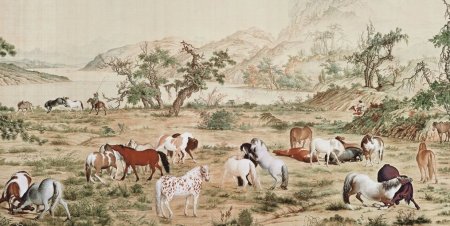
标签:animals, asia, body, capitalism, children, china, cultural heritage, Cultural Revolution, culture, 美国 America, death, demolishing, destruction, dictators, earth, East Asia, economy, education, Europe, famine, Fascism, growing up, Hannah Arendt, history, human, human rights, humane, humanities, humanity, humans, hunger, language, life, love, media, memory, nazis, news, people, philosophy, poetry, politics, question, questions, re-education, rights, social media, socialism, society, south america, Southeast Asia, soviet union, terror, totalitarian, UN, world
发表在 1910s, 1920s, 1930s, 1940s, 1950s, 1960, 1960s, 1966, 1970s, 1975, 1976, 1980s, 1990s, 2000s, 2010s, 2019, 20th century, 21st century, Antique times, April 2019, March 2019, Middle Ages, Old Egypt, poetry, PR, prose, Roman times, Stone Age, Uncategorized, Warring States | Leave a Comment »
3月 17, 2019
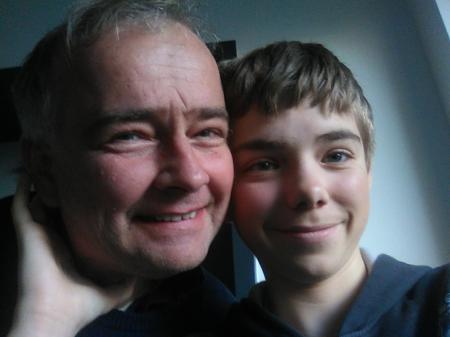
14
our son wakes up with the light
he’s 14 now
that’s our problem
we need a school
where he learns enough
to get a job
and so on and so on
our son wakes up with the light
MW March 2019
NOTHING
there is nothing
there is nothing
there is nothing more
there is nothing more
there is nothing more beautiful
there is nothing more beautiful
there is nothing more beautiful than light
there is nothing more beautiful than light
in the morning
MW March 2019
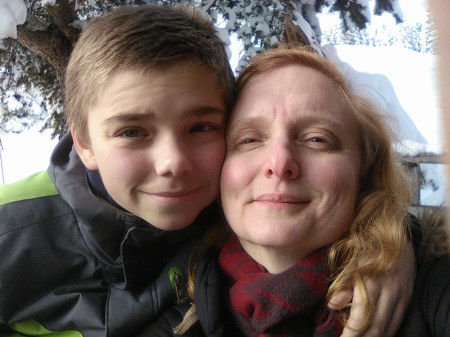
KOSICE
Kosice has several synagogues.
They razed the oldest one in 1960.
One is active, across the street
is a café called The Smelly Cat,
live jazz in the evening.
The biggest synagogue
is the concert hall
of the city.
1100 seats.
12,000 people deported in 1944.
There are many churches.
Elisabeth Cathedral
has a mural for Sára Salkaházi, 1899-1944.
She saved about 100 Jews.
2013-2019
OLOMOUC ART MUSEUM COLLECTION
we look very young,
you look very young
among the statues,
must be main square.
a surrealist flair.
astronomy clock plays with its bells
at noon. shows happy members
of working classes.
very nice college town,
behind the australian hostel
is a square hussite church.
2013-2019
IMMER NUR DIE KULTUR
immer
immer nur
immer nur die
immer nur die kultur
immer nur die kultur
immer nur die kultur-
revolution
immer nur die kultur-
revolution
seit 1966
immer nur die kultur-
revolution
immer nur die kultur-
revolution
immer nur die kultur
immer nur die kultur
immer nur die
immer nur
immer
nicht die hungersnot
oder
oder doch
oder doch auch
die zig millionen
hungertoten
oder
oder doch
oder doch auch
der terror
der terror der
totalitären herrschaft
“totalitär” gibt es in wörterbüchern
und in chinesischen suchmaschinen
china wird dabei höchstens
ganz wenig gestreift
als nachbarstaat der sowjetunion
und in der kunst
der bildenden kunst
der kulturrevolution
immer nur die kultur
immer nur die kultur
hannah arendt
ist 1975 gestorben
also vor dem ende
der kulturrevolution
in der letzten auflage ihres hauptwerks
ursprünge und elemente totalitärer herrschaft
erwähnt sie china
in der kulturrevolution
kaum jemand sprach damals von hungersnot
immer nur die kultur
immer nur die kultur
oder
oder doch
oder doch auch
der terror
der terror
pinochet
pol pot
kissinger
wer hat mehr
wer hat mehr
wer hat mehr bombadiert
1979 war die mauer der demokratie
in peking
seit 1979
regiert der kapitalismus
die partei regiert
mithilfe des kapitalismus
und umgekehrt
mithilfe des kaputtalismus
und umgekehrt
es wird kaputt gemacht und neu gebaut
und wieder kaputt gemacht
und umgekehrt
natürlich nur in china
oder
oder doch
oder doch auch
immer nur die kultur
immer nur die kultur
immer nur die
immer nur
immer
immer
MW März 2019
标签:age, art, asia, children, Cultural Revolution, culture, East Asia, Europe, family, famine, government, grandparents, growing up, history, life, memory, parents, philosophy, poetry, politics, school, terror, travel, war, work
发表在 1940s, 1944, 1950s, 1960, 1960s, 1966, 1970s, 1979, 1980s, 1990s, 2000s, 2005, 2010s, 2019, 20th century, 21st century, Uncategorized | Leave a Comment »
2月 13, 2019

AUFSTOSSEN
omi ist da
ich kann mich satt essen
kann mich satt essen
und
aufstossen
aufstossen fühlt sich herrlich an
Übersetzt von MW IM Februar 2019


标签:body, eating, family, feeling, food, growing, growing up, Hai Jing, history, memory, NPC, poetry, 新世纪詩典, 海菁
发表在 2019, 20th century, 21st century, February 2019, NPC, poetry, Translations, Uncategorized, 新世纪诗典 | Leave a Comment »
10月 17, 2018

Fang Miaohong
PRANK
When I was small
my favorite prank was
to ring the bell at someone else’s door
and run away
When you grow up
and ring the bell at someone’s door
you have to go in
Translated by MW, October 2018
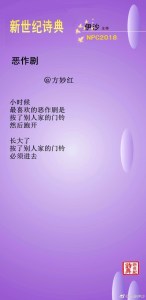


伊沙主持 | 新世纪诗典8一周联展(2018.10.14——10.20)
标签:age, bell, childhood, door, Fang Miaohong, growing up, house, memory, NPC, people, poetry, 新世纪詩典, 方妙红
发表在 2018, 20th century, 21st century, NPC, October 2018, poetry, Translations, Uncategorized, 新世纪诗典 | Leave a Comment »
4月 19, 2018
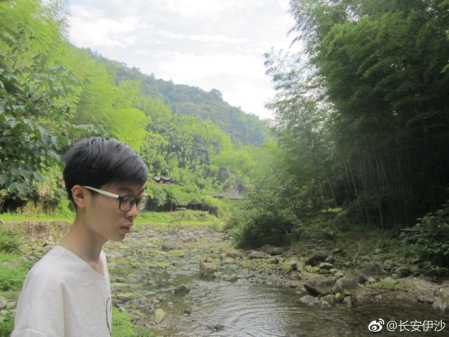
Yang Du
ANGELERNT
er sagt mir
er braucht nur drei striche
und zeichnet mir eine nackte frau
in wirklichkeit sind es vier striche
nur vier striche
und auf meinem prüfungsbogen
neben meinem namen ist eine nackte frau
dann betont er mehrere male
das hat ihm vor jahren ein mitschüler beigebracht
das hat er nicht selbst rausgekriegt
das hat er nicht selbst rausgekriegt
2017-12-13
学来的本领
@杨渡
他告诉我
他能画一个女人的裸体
只需要三笔
事实证明这需要四笔
只是四笔
我试卷的名字边上
多了一个女人的裸体
画完后他反复强调
这是小学时的同学教他的
不是他自己琢磨出来的
不是他自己琢磨出来的
2017.12.13
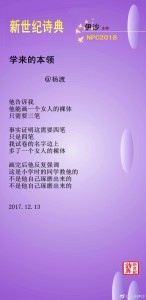
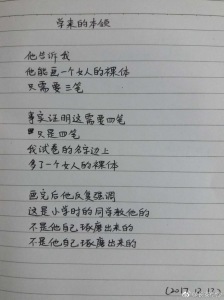
标签:art, body, boys, children, craft, drawing, growing up, learning, lust, men, NPC, painting, poetry, practice, school, skill, women, Yang Du, youth, 新世纪诗典, 杨渡
发表在 2010s, 2017, 2018, 21st century, Antique times, April 2018, December 2017, Middle Ages, NPC, poetry, Stone Age, Translations, Uncategorized, 新世纪诗典 | Leave a Comment »
4月 5, 2018

Ma Fei
IM KOPF
In Kanton
hat mir Xiang Lianzi erzählt
sie hat Patienten
die sind schon zig Jahre alt
aber vom Verstand her vier oder fünf.
Sie hat ein Experiment gemacht
und ihnen Gedichte vorgelesen.
Von alten Versen waren sie verzaubert,
sie haben mit Händen und Füßen getanzt.
Bei modernen Gedichten
haben sie entweder nicht reagiert
oder sie sind beunruhigt geworden.
Während sie es erzählt hat
wollt ich schon aufspringen
und hab ihr aufgeregt vorgeschlagen
sie muss darüber schreiben.
Jetzt ist ein Monat vorbei,
ich denk immer daran,
vielleicht hat sie schon etwas geschrieben.
Übersetzt von MW im April 2018


标签:classical poetry, classics, colleagues, dancing, 马非, growing up, health, intelligence, listening, Ma Fei, mental, nervous, NPC, old, patient, patients, people, poetry, progress, speaking, thinking, writing, Xiang Lianzi, young, 新世纪詩典, 湘莲子
发表在 2010s, 2018, 20th century, 21st century, Antique times, April 2018, March 2018, Middle Ages, NPC, poetry, Stone Age, Tang Dynasty, Translations, Uncategorized, 新世纪诗典 | Leave a Comment »
2月 11, 2018

VON WEISSBRIACH NACH WIEN
die seele wandert wie ein kamel
manchmal trinkt sie sehr viel
manchmal bleibt sie durstig
sie ist sicher langsamer
als eine schnellbahn
unsere seelen
sind noch in kärnten
MW Februar 2018
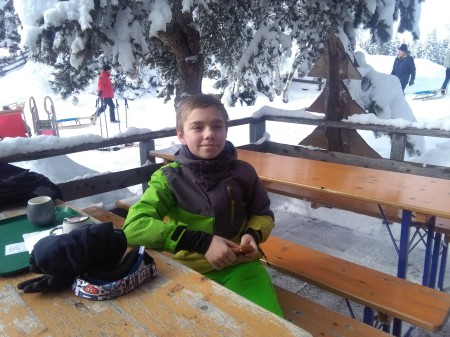
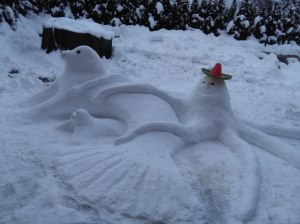
标签:austria, body, Carinthia, family, fun, growing up, kids, poetry, skiing, snow, soul, time, travel, vacation
发表在 2018, February 2018, poetry, Uncategorized | Leave a Comment »
5月 2, 2017
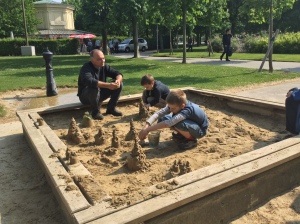
photo by David Howard
DER WIENER BÜRGERMEISTER
häupl lächelt noch immer
er gibt schon etwas her
vor häupl war zilk
vor zilk war der gratz
der poldi gratz
haben manche gesagt
das war unter kreisky
was vorher war wissen nur meine eltern
der herr bürgermeister möchte ein foto mit ihnen
ich hätt nichts dagegen gehabt
meine eltern wollten nicht
mein vater war bei der övp
damals
busek und bunte vögel
jörg mauthe
am ende sehr nahe an gratz
dann kam der zilk
eine faszination
egal ob er spion war
ich sitz im rathauspark an einen baum gelehnt
hab gelernt und gelesen
die uni ist gleich daneben
zilk eilt vorbei
und stampert mich weg
aus dem gras
häupl bin ich noch nicht
persönlich begegnet
MW 1.Mai 2017

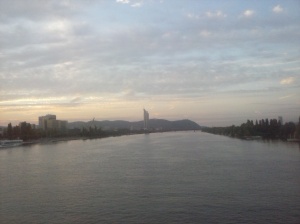
标签:austria, children, city hall, elections, growing up, history, mayor, media, memory, park, parties, people, photo, politics, PR, Vienna, Vienna University
发表在 1970s, 1980s, 1990s, 2000s, 2010s, 2017, May 2017, poetry, PR, prose, Uncategorized, Welcome! | Leave a Comment »
5月 2, 2017
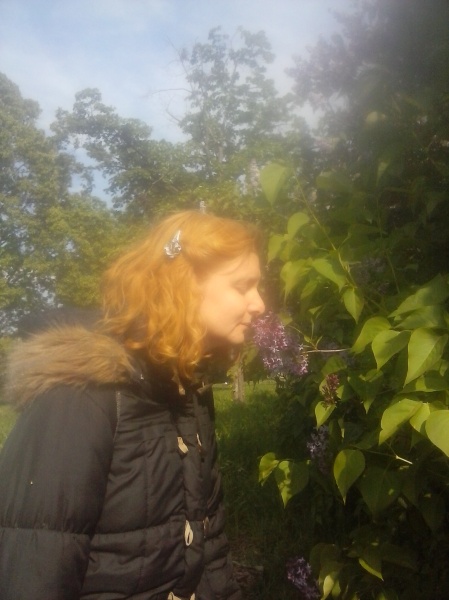
TAKT DER ARBEIT
was ist ein takt der arbeit?
was ist ein anderer takt der arbeit?
was ist ein takt des wachsens?
was ist ein takt des spielens?
was ist ein takt des kennenlernens?
was ist ein takt der ferne?
was ist ein takt der arbeit?
was ist ein takt der freiheit?
ein takt
eine nacht
MW 1.Mai 2017
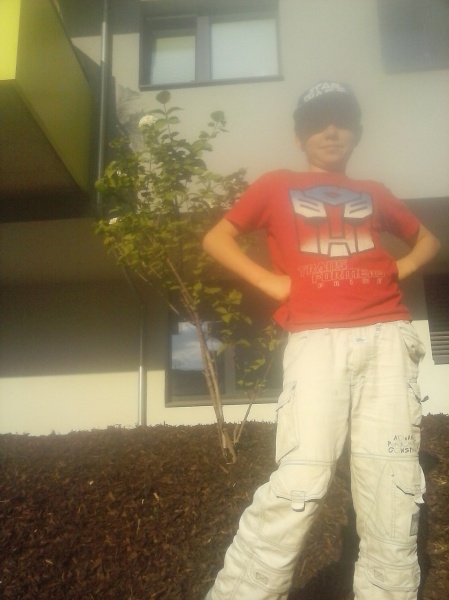
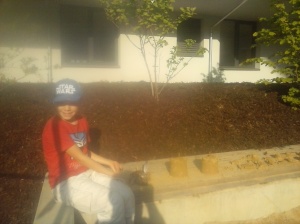 p
p
标签:austria, children, day, distance, education, freedom, growing up, life, May Day, meet, night, people, play, rhythm, time, Vienna, work
发表在 2017, May 2017, poetry, Uncategorized | Leave a Comment »
5月 27, 2015

Song Ninggang
BAMBUS
unten im hof
mein sohn muss lulu
ich bring ihn zu
dem bambus
am gartenrand
aber er will nicht
der grund ist
wenn er auf den bambus macht
frisst der panda den bambus nicht
ich bring ihn
auf die seite
schieb ihn ein bisschen weiter
jetzt zieht er die hose hinunter
und pisst beruhigt
in hohem bogen ins gras
und schaut die ganze zeit
in den bambus
Übers. v. MW, 2015
标签:bamboo, downstairs, food, grass, growing up, kids, panda, peeing, poetry, Song Ninggang, 宋宁刚, 新世纪诗典
发表在 MAY 2015, poetry, Translations, Uncategorized | Leave a Comment »





















































